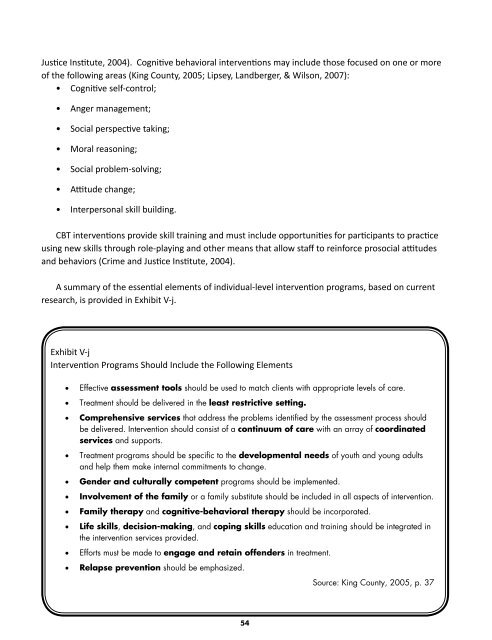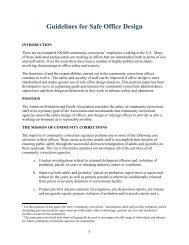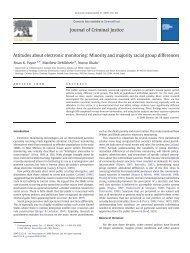Intervention Principles and Practice Guidelines for - Underage ...
Intervention Principles and Practice Guidelines for - Underage ...
Intervention Principles and Practice Guidelines for - Underage ...
You also want an ePaper? Increase the reach of your titles
YUMPU automatically turns print PDFs into web optimized ePapers that Google loves.
Justice Institute, 2004). Cognitive behavioral interventions may include those focused on one or more<br />
of the following areas (King County, 2005; Lipsey, L<strong>and</strong>berger, & Wilson, 2007):<br />
• Cognitive self-control;<br />
• Anger management;<br />
• Social perspective taking;<br />
• Moral reasoning;<br />
• Social problem-solving;<br />
• Attitude change;<br />
• Interpersonal skill building.<br />
CBT interventions provide skill training <strong>and</strong> must include opportunities <strong>for</strong> participants to practice<br />
using new skills through role-playing <strong>and</strong> other means that allow staff to rein<strong>for</strong>ce prosocial attitudes<br />
<strong>and</strong> behaviors (Crime <strong>and</strong> Justice Institute, 2004).<br />
A summary of the essential elements of individual-level intervention programs, based on current<br />
research, is provided in Exhibit V-j.<br />
Exhibit V-j<br />
<strong>Intervention</strong> Programs Should Include the Following Elements<br />
• Effective assessment tools should be used to match clients with appropriate levels of care.<br />
• Treatment should be delivered in the least restrictive setting.<br />
• Comprehensive services that address the problems identified by the assessment process should<br />
be delivered. <strong>Intervention</strong> should consist of a continuum of care with an array of coordinated<br />
services <strong>and</strong> supports.<br />
• Treatment programs should be specific to the developmental needs of youth <strong>and</strong> young adults<br />
<strong>and</strong> help them make internal commitments to change.<br />
• Gender <strong>and</strong> culturally competent programs should be implemented.<br />
• Involvement of the family or a family substitute should be included in all aspects of intervention.<br />
• Family therapy <strong>and</strong> cognitive-behavioral therapy should be incorporated.<br />
• Life skills, decision-making, <strong>and</strong> coping skills education <strong>and</strong> training should be integrated in<br />
the intervention services provided.<br />
• Ef<strong>for</strong>ts must be made to engage <strong>and</strong> retain offenders in treatment.<br />
• Relapse prevention should be emphasized.<br />
Source: King County, 2005, p. 37<br />
54

















